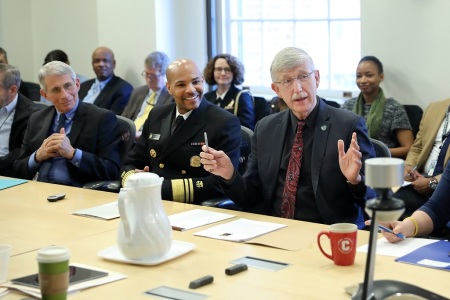Francis Collins says COVID-19 vaccines don't use 'fresh' fetal tissue: 'Absolutely not the case'

The evangelical director of the National Institutes of Health answered some of the common concerns tied to the COVID-19 vaccines in a new podcast for the National Association of Evangelicals in which he urged Christians to take part in the vaccine rollout.
In a Friday conversation with NAE President Walter Kim, the pastor of Trinity Presbyterian Church in Charlottesville, Virginia, NIH director Francis Collins weighed in on the ethical dilemmas some are expressing about the recently unveiled coronavirus vaccines.
Collins, the author of The Language of God: A Scientist Presents Evidence for Belief and founder of The BioLogos Foundation, offered that Christians should approach the current public health crisis to not only call upon God for help but also to recognize that God calls Christians to be part of the solution.
"In times of plague, and it's not the first one nor will it be the last, Christians have had a tradition of not running away from the challenge but running toward it," the 70-year-old geneticist said.
What the vaccines do is attempt to convince human immune systems to produce antibodies to fight the proteins of the virus so they will be ready to attack. None of the latest vaccines are made up of the entire virus.
The Moderna approach utilizes the coding information for the spike protein in the molecule called RNA. That is injected into the shoulder of the patient, and the body then recognizes the spike protein and fights it. The trials of approximately 30,000 patients have shown that this has a 95% effective rate in preventing people from getting sick if they are going to be out in the community and exposed to the disease, he said.
Collins emphasized that the medical data should drive the decision-making of Christians, not a "crazy posting" on social media or opinions that might be heard on the street.
"We are people who are capable of rational thought," he contended. "We should be using it right now even as we are giving thanks to God Almighty that we are in a position to say that this pandemic could be behind us."
Chief among the concerns some Christians have about vaccines is the utilizing of tissue derived from babies aborted decades ago to develop the vaccine. Some pro-life advocates have urged others not to take the AstraZeneca coronavirus vaccine because of such concerns.
"No current fetal tissue is being used for any of these vaccines," Collins said, noting that he is often asked about what Christians should do in order to maintain a consistent pro-life ethic.
The only connection to tissue from aborted fetuses being used in vaccines is from cell lines derived in the 1960s and 1970s from elective abortions in Scandinavia at a time when it was legal, he explained. Those cell lines turned out to be useful in the biotechnology industry for a variety of purposes, so they have been put to work.
The vaccines are made with synthetic RNA and lipids but no cell lines, he continued. The cell lines have been used to evaluate whether vaccines are safe and effective. He assured that the lines have not been involved in the production of the Pfizer and Moderna vaccines.
"I think people should be fairly reassured, though, because there's a lot of suggestion that this is utilizing fresh fetal tissue right now. That is absolutely not the case," he stressed.
Speaking to those who say they prefer to wait until herd immunity is reached, the NIH director said that would require around 80% to 85% of the population to be exposed and most will have to take some risk. He argued that such a view does not sound like a particularly compelling Christian position.
"Aren't we supposed to be the people who are supposed to be looking out for others and try to put ourselves in the love-your-neighbor position and doing what we need to do — not just for ourselves but also for everybody else,” he said. “So, I would think that Christians would be uncomfortable espousing that particular approach and just expecting that everyone around them is going to take care of them."
"It doesn't seem quite like the kind of attitude that Jesus calls us to,” he added.
If Christians want to run toward a solution in a time of crisis they can volunteer to take the vaccine or participate in the trials, he added.
Asked about the concerns being voiced regarding the vaccine among African Americans given the painful history of medical abuse they have endured in the U.S., Collins acknowledged that it is a serious issue. He noted the Tuskegee syphilis experiment.
"We have a lot of work to do to convince the African American and Hispanic communities that this is really in their best intention, and that, I think, requires voices, not like mine — a white guy who works for the government,” he said. “But [we need] leaders in those communities who look at the evidence and say, 'Ok, there were some bad things that happened in the past, but this time, this is actually something that's going to be good for us. Let's not pass it up.’”
Collins believes January 2021 may be the worst month yet in terms of the risk of disease spread. He urged people to continue taking precautionary measures like social distancing and wearing masks.
"None of us know if we may be that asymptomatic but highly infected individual whose mere presence in a closed room might be the start of something regrettable and egregious for those around us," he said.
At a recent government celebration announcing the vaccine, Collins read Psalm 103, part of which praises God for forgiving sins and healing diseases.
"Praise the Lord, my soul, and forget not all his benefits — who forgives all your sins and heals all your diseases," Psalm 103:2-3 reads in the NIV.





















